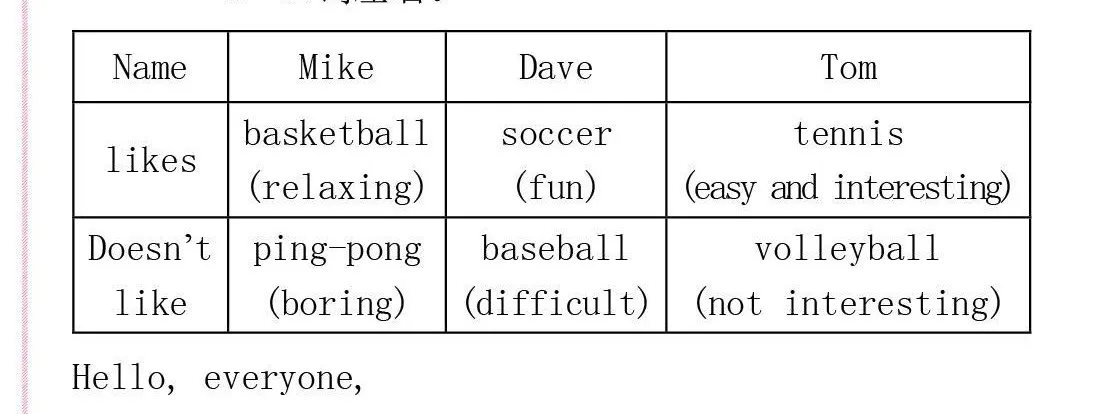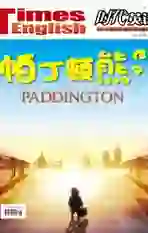本模块知识网络Unit 5 Do you have a soccer ball?
2015-04-29
Section A
1. —Do you have a ping-pong bat?
你有乒乓球拍吗?
—Yes, I do.
是的,我有。
(1)do(第三人称单数形式为does)aux v. v.用于构成否定句和疑问句;做;干
①构成否定句
当一个句子由“主语+实义动词+(宾语)”结构组成时,要想把这个句子变成否定句,常常在行为动词的前面加上don’t或doesn’t。主语是第一人称、第二人称或复数时,用don’t;主语是第三人称单数时,用doesn’t。
Bob doesn’t clean the window.
鲍勃没有清洗窗户。
We don’t study French.
我们不学法语。
②构成疑问句
如果一个英语句子的结构是“主语+实义动词+宾语”,要把这样的句子变为疑问句,我们常在主语的前面加上do或does,句子的谓语用动词原形,并把句子的句号改为问号。主语是第一人称、第二人称或复数时,用do提问;主语是第三人称单数时,用does提问。
Does she have a pen?
她有钢笔吗?
Where do they work?
他们在哪里工作?
(2)have(第三人称单数形式has)v. 有
动词have作为“有”使用时,表示“某人(物)有……”,用于第一二人称单数和复数主语;其单数第三人称形式为has,用于第三人称单数和单数主语。
①肯定句:主语+ has/have + 宾语
I have an English book.
我有一本英语书。
He has a basketball.
他有一个篮球。
They have many friends.
他们有很多朋友。
②否定句:主语+ don’t/doesn’t + have +宾语
I don’t have an English book.
我没有英语书。
She doesn’t have a new bike.
她没有新自行车。
③一般疑问句:Do/Does + 主语 + have + 宾语?
— Do you have an English book?
你有英语书吗?
— Yes, I do. / No, I don’t.
是的,我有。/不,我没有。
— Does she have any friends?
她有一些朋友吗?
— Yes, she does. /No, she doesn’t.
是,她有。/不,她没有。
④特殊疑问句:特殊疑问词+ do/does + 主语+ have...?
How many friends does Jenny have?
珍妮有多少朋友呢?
当特殊疑问词作主语时,直接用“特殊疑问词+ has/have + 其他”。例如:
Who has an English book?
谁有英语书?
have与there be句型的区别
There be表示“在某处存在某物”,而have则表示所属的意思,即“拥有”,通常是人。例如:
There is a book on the desk.
书桌上有一本书。
I have many books.
我有很多本书。
2. Hey, Helen, let’s go! We’re late!
嘿,海伦,我们走吧!我们迟到了!
(1)let v. 允许;让
Let me help you carry this desk.
让我帮你搬这张桌子。
注意:以动词let开头的祈使句,意为“让某人做某事”,表示说话人的建议,该句型结构是let sb do sth。对该祈使句的回答一般用OK、all right等。否定回答用Sorry, I... 等来回答。
— Let’s sing ABC song.
让我们唱字母歌吧。
— All right. / Sorry, I can’t sing it.
好吧。/对不起,我不会唱。
(2)go v. 去;走

go常与to构成动词短语,后接地点名词,表示“去某个地方”。
go to school 去上学
go to the park 去公园
go to Beijing 去北京
比较:come和go的区别
come表示“来”,从其他地方到说话人所在地方;go表示“去”,从说话人处去另外一个地方。
come to school表示让某人来学校,说明说话人目前是在学校;go to school表示去学校,说明说话人目前不在学校。
(3)late adj. 迟到
You are late again, don’t be late next time.
你又迟到了,下次别这样了。
be late for... …… 迟到
He is late for school.
他上学迟到了。
3. That sounds good.
听起来很好。
这里sound是系动词,意为“听起来”,后常跟形容词作表语。句中的that用来指代上文中提出的建议,英语中指前面所述内容或事情,通常用that,而不用this。
— Let’s listen to the light music.
让我们听轻音乐吧。
— That sounds great.
这听起来不错。
Her idea doesn’t sound good.
她的主意听起来不行。
Grammar Focus
活学活用
请把下列句子变成否定句和一般疑问句。
1. I know the city well.
I ____ know the city well.
____ ____ know the city well?
2. They want to have a cup of tea.
They ____ want to have a cup of tea.
____ they want to have a cup of tea?
3. She is a very beautiful girl.
She ____ a very beautiful girl.
____ she a very beautiful girl?
4. My father works in the factory as a worker.
My father ____ ____ in the factory as a worker.
____ ____ father ____ in the factory as a worker?
Section B
1. fun adj. 有趣的;使人快乐的
n. 乐趣;快乐
(1)fun可用作形容词,意为“有趣的”、“令人愉快的”。
This is a fun story.
这是一个有趣的故事。
There are lots of fun things to do here.
这儿有很多有趣的事可以做。
(2)fun可用作不可数名词,意为“享乐”、“乐趣”。
Have fun!
尽情地玩吧!
Sailing is good fun.
帆船运动很有乐趣。
2. I love sports, but I don’t play them—I only watch them on TV.
我喜欢运动,但我不做运动——我仅仅在电视上看运动。
(1)句中的but意为“但是”,常用来连接两个并列的成分,表示“转折”关系。例如:
I play basketball, but I don’t play soccer.
我打篮球,但不踢足球。
His mother won’t be there, but his father might.
他母亲不会在那里,但他父亲也许会去。
and的用法与but相同,也是用来连接两个并列的成分,表示“并列”关系。
Do it slowly and carefully.
要慢慢仔细地做。
(2)only adv. 只;仅仅
修饰主语时,通常放在主语之前;修饰主语以外时,通常放在动词之前,be 动词或助动词之后。
Only you can do it.
只有你能做到。
It only takes a few seconds.
那只需要几秒钟。
I can only play tennis.
我只会打网球。
活学活用
将下列句子排序。
5. No, tennis is difficult. Let’s play ping-pong.
6. Then let’s play basketball.
7. No, I don’t. But my brother has one.
8. Where is his basketball?
9. Let’s play tennis.
10. Ping-pong is boring.
11. Under the bed.
12. That sounds good. Do you have a basketball?
13. Great! Let’s go and get the ball.
14. OK. Let’s go.
英汉互译
1. soccer ball
2. sport
3. 有
4. ball
5. 排球
6. basketball
7. 听起来好像
8. 参加;玩耍
9. watch
10. interesting
连词成句
1. have, I, a, don’t, bat, baseball
.
2. many, they, friends, have
.
3. him, ask, go, and, let’s
.
4. have, a, you, do, volleyball
?
5. interesting, that, is, book, very
.
首字母填空
1. L play tennis.
2. We have many s clubs: basketball, ping-pong and so on.
3. I don’t want to watch TV. It’s b .
4. Michael Jordan plays b well.
5. That s interesting.
6. D Dock have a bat?
7. Tom, this is my f , Katrina.
8. — W to our school.
— Thank you.
9. I want to play w them.
10. I her teacher Miss Gao?
用所给词的适当形式填空
1. That ____ (sound) great.
2. ____ you ____ (have) a tennis racket?
3. My brother ____ (have) a baseball bat.
4. We have many ____ (club) in our school.
5. Let watch ____ (they) on TV.
6. She ____ (play) sports every day.
7. Can you ____ (bring) your new pen here?
8. ____ your friend ____ (like) sports?
9. Let ____ (we) play tennis.
10. That’s an ____ (interest) computer game.
单项选择
( ) 1. ___ your father ___ a brother?
A. Is; haveB. Do; has
C. Does; haveD. Does; has
( ) 2. — Do Barry and Peter have a baseball?
— Yes, they ___ .
A. hasB. do
C. haveD. does
( ) 3. Tim and Jim, let’s play ___ soccer.
A. aB. the
C. /D. an
( ) 4. — Let’s play tennis.
— That ___ very good.
A. soundsB. sound
C. hasD. have
( ) 5. — Your English is very good!
— ___ .
A. You’re rightB. Thank you
C. You are goodD. No, no
( ) 6. — Let’s play volleyball.
— No, it’s ___ .
A. boringB. interesting
C. goodD. fun
( ) 7. That’s an ___ question.
A. interestingB. boring
C. difficultD. relaxing
( ) 8. Do you play ___ ?
A. basketballsB. a basketball
C. basketballD. the basketball
( ) 9. That sounds ___ .
A. wellB. badly
C. goodD. interested
( ) 10. — Emily ___ TV every day.
— That is not good.
A. takesB. looks
C. watchesD. plays
句型转换
1. Li Ping has a Soccer ball.(改为一般疑问句)
____ Li Ping ____ a soccer ball?
2. Does she have a CD?(作肯定回答)
____ , she ____ .
3. He has a baseball bat.(改为否定句)
He ____ ____ a baseball bat.
4. You have a volleyball.(改为一般疑问句)
____ you ____ a volleyball?
5. The boy doesn’t have a bike.(改为肯定句)
The boy ____ a bike.
6. I have a nice book.(改为否定句)
I ____ ____ a nice book.
7. He likes his new room.(改为一般疑问句)
____ he ____ his new room?
8. Frank has four baseballs.(对画线部分提问)
____ ____ Frank ____ ?
9. My parents have five children.(对画线部分提问)
____ ____ children do your parents have?
10. Do your father and mother like sport?(作肯定回答)
____ , they ____ .
完形填空
Look at the girl. She is 1 good friend. She is 2 English girl. 3 name is Jenny. She is twelve. My 4 is Li Huan. 5 a Chinese girl. I’m eleven.
Jenny 6 a small sports collection. She has 7 tennis racket, two basketballs, and three baseballs, but I only 8 a soccer ball. Jenny and I both (都) 9 sports every day. We are in the same class. We help each other 10 our lessons.
( ) 1. A. IB. meC. myD. your
( ) 2. A. aB. anC. theD. \
( ) 3. A. She’sB. SheC. HisD. Her
( ) 4. A. friendB. brotherC. nameD. bag
( ) 5. A. IB. I’mC. ItD. It’s
( ) 6. A. doB. isC. doesD. has
( ) 7. A. oneB. twoC. threeD. four
( ) 8. A. amB. haveC. am notD. don’t have
( ) 9. A. playB. playsC. playingD. to play
( ) 10. A. toB. inC. withD. at
阅读理解
A
My friend Sally is a sports fan (爱好者). She has a great sports collection. She has three soccer balls, five baseballs, six volleyballs and two basketballs. They are all under her bed. Sally plays basketball very well. She likes Kobe. She thinks he is the best (最好的) basketball player in America and she also likes Yao Ming from China. Sally plays baseball very well, too. Now she is in her school baseball club.
( ) 1. Sally has ___ volleyballs.
A. sixB. five
C. threeD. two
( ) 2. Kobe is a ___ .
A. studentB. basketball player
C. teacherD. baseball player
( ) 3. Sally plays ___ and basketball very well.
A. soccerB. volleyball
C. baseballD. tennis
( ) 4. Sally is ___ .
A. a sports fan
B. Kobe’s sister
C. an English teacher
D. in her school basketball club
( ) 5. We can find ___ under Sally’s bed.
A. some notebooksB. a watch
C. three booksD. many balls
B
根据对话内容,判断正(T)误(F)。
Jim: Let’s play computer games.
Peter: That sounds good. Where’s your computer?
Jim: I don’t have a computer. Do you have a computer?
Peter: No, I don’t. But I have a TV. Let’s watch TV.
Jim: No, it’s boring. Let’s play tennis. I have a tennis racket.
Peter: Good. Where is it?
Jim: On the sofa. Do you have a racket?
Peter: No, I don’t. Does your brother have a racket?
Jim: Yes, he does. And he has tennis balls.
( ) 6. Jim has a computer.
( ) 7. Jim’s racket is on the sofa.
( ) 8. Peter and Jim are watching TV now.
( ) 9. Jim has two tennis rackets.
( ) 10. Jim’s brother has tennis balls.
选词填空
从方框中选出恰当的词,并用其适当形式填空。
boring, relax, difficult, play, we,
have, watch, interest, sound, apple
1. John sits on the chair. It’s very ____ .
2. Sue can ____ volleyball. She thinks it’s very fun.
3. I don’t like maths. It’s ____ .
4. That book is very ____ . I like it very much.
5. I can’t play computer games. It’s very ____ .
6. His idea ____ very good.
7. Many students like ____ .
8. They are ____ a football match on TV.
9. Jim ____ a brother. He is seven years old.
10. He teaches ____ English.
补全对话
A: Let’s play ping-pong.
B: 1 But I don’t have a ping-pong bat. Do you have a bat and a ball?
A: No. I don’t. But I have a soccer ball. 2
B: No, 3 Let’s play tennis. I have a tennis racket.
A: 4
B: It’s in my desk. Do you have a tennis racket?
A: Yes, 5
A. let’s go.
B. That sounds fun.
C. Let’s play soccer.
D. That sounds boring.
E. Good. Where is it?
1. 2. 3. 4. 5.
书面表达
假设你叫Jack,英语课上,老师让大家讨论自己喜欢和不喜欢的运动。请根据表格提示,介绍下面几位同学的爱好。
要求:1. 句子通顺;
2. 书写工整、格式规范;
3. 60词左右。
NameMike DaveTom
likesbasketball
(relaxing)soccer
(fun)tennis
(easy and interesting)
Doesn’t
likeping-pong
(boring)baseball
(difficult)volleyball
(not interesting)
Hello, everyone,
My name is Jack, I like playing basketball.
How about you? What kind of sport do you like?
